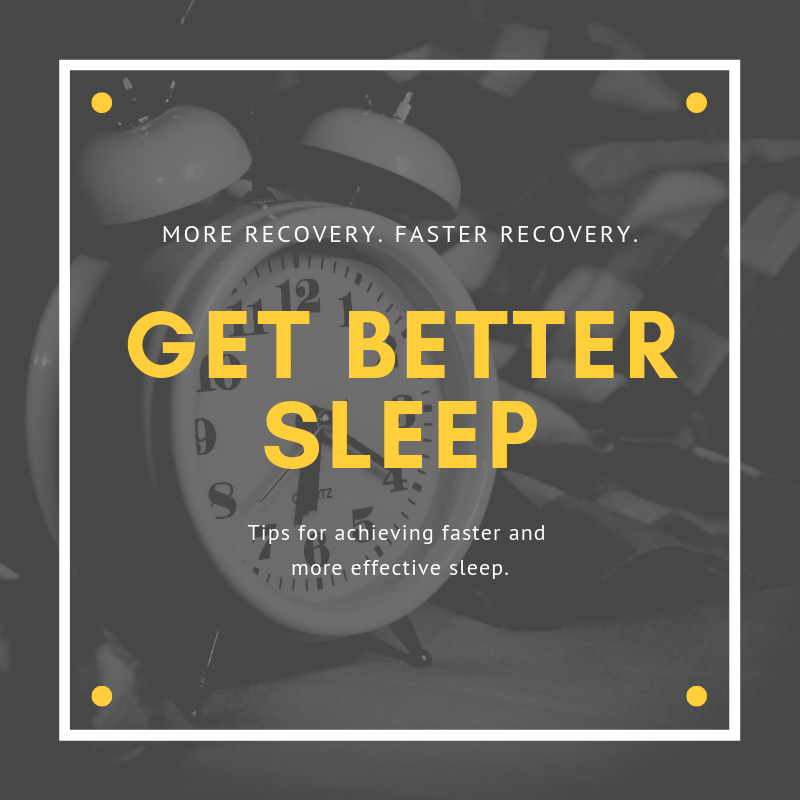Sleep. How to get more sleep, get better sleep, and keep the sleep you get.
S leeping is easy, right? We just lie down when we get tired, close our eyes, and a few hours later, wake completely refreshed to the sounds of songbirds and waterfalls.
leeping is easy, right? We just lie down when we get tired, close our eyes, and a few hours later, wake completely refreshed to the sounds of songbirds and waterfalls.
Nope. When we practice working long hours, use artificial lighting to keep the darkness away, and employ jarring radio stations to rouse ourselves from bed in the morning, we are violating all the sleep adaptations that have evolved over millions of years. Sleep isn't like a Netflix series - we can't miss some and just make up for it later. Sleep debt is a real thing - and it can have highly destructive effects on your health and fitness.
If you have serious sleep issues of a medical nature, then referrals from your doctor may be a viable solution. Some of our suggestions involve supplementation, which should only be taken under the advice and supervision of your physician. However, most people just need a few adjustments to make a positive impact on their sleep quality. There are many simple, easy, and effective methods that anyone can use to get a better night's sleep right away.
First, let's talk about what not to do.
1. Eliminate light sources, especially blue light.
Humans evolved as diurnal animals, meaning we are active during the day, and sleep during the night. Light sourcse, or lack thereof, increase or decrease our production of melatonin, the sleep hormone. Melatonin synchronizes our sleep-wake cycles with the sun. Or in modern times, with artifical light sources. Eliminating as many lights as possible before bedtime will increase its production, thereby preparing the body for sleep. While there's still some disagreement an whether or not blue light (i.e. light produced from computer and TV screens) in and of itself is directly harmful per se, it certainly inhibits the synthesis of melatonin. If you must use a computer or TV at night, a spectrum-shifting program like f.lux or the Night Shift mode found on iPhones can help eliminate the blue light influence.
2. No alcohol before bed.
Whereas a quick drink before heading off to sleep may provide inital relaxation, and even get you to sleep faster, it has a pronounced effect on the REM stage of sleep - the part that actually restores you for the next day. Alcohol increases the production of adenosine (a sleep-promoting chemical) but it will drop just as quickly, causing that 2:00 am walk to the bathroom that always goes over so well. Add in more snoring, due to alcohol-induced muscle relaxation, and no one else in the house is going to get a good sleep either. And the more you drink, the worse the sleep disruption. That's probably why no one ever felt grateful they had that extra shot of tequila before hitting the sack. Alcohol basically tricks you into thinking you slept better. Bad, bad alcohol. Try to cease all alcohol consumption at least two hours before bedtime.
3. Don't take sleeping pills (unless your doctor told you to).
Also a shortcut to sleep, sleeping medications (such as Ambien, Halcion, Sonata and many others) can have numerous side effects, including dizziness, memory loss, or changes in appetite and digestion. And that's not even considering the addictive nature of many of the medications. Stay away from these unless your physician has prescribed them for a reason.
4. No late-night workouts
While working out is awesome, and should be done every day (in some capacity - remember, recovery is when we build muscle), exercising too close to bedtime can cause sleeping difficulties. Vigorous excercise will destabilize your heartbeat, which it should, but this will also make relaxing into sleep more difficult, no magttter how exhausted that WOD makes you. Also, the release of stress hormones during exercise will cause you to remain more alert and awake. Fight or flight, anyone? Not likely too many stone agers dropped off for a quick nap after evading a sabertooth tiger. Plus - bright lights at the gym (see #1 above), so unless you attend Crossfit Amish and use candlelight, those are going to keep you awake too.
Ok, that covers a few things to avoid. But what are some of the proactive measures you can take? Let's start with one of the better-known ones.
1. Melatonin
As we already discussed, melatonin is the sleep-regulation hormone produced by the pineal gland. Often air travelers who cross into earlier time zones (that's traveling east, folks) will take some supplemental melatonin in order to advance their circadian clocks to match the new location. However, this should really only be used on occasion; the human body usually releases melatonin over time, rather than in one big dose - so a large supplemental melatonin dose could be more than you need. There are types of melatonin available that are listed as time-release, which could be more of a benefit.
2. Chill out
Research, both clinical and anecdotal, shows that cooling your environment before going to bed will help you sleep faster and deeper. Our bodies naturally lower in temperature as metabolism and internal fuel consumption slows, so cooling your sleeping environment will support that natural process. A room that is too warm will keep us awake longer. Also, cooler temperatures (between 60 and 68 degrees) stimulate melatonin production. Have we mentioned melatonin enough?
3. Glycine
Glycine is a neurotransmitter and amino acid. While the body does internally create glycine from other chemicals, glycine can also be consumed from high-protein food sources. Used by many as an oral supplement, it can both stimulate and and inhibit brain activity. One common use for glycine is as a sleep aid. It can increase levels of seratonin, which is a precursor to that magic chemical melatonin. Glycine can also effect a drop in body temperature, which as we also discussed, will help with both falling asleep and maintaining deep sleep. Again, consult your doctor before supplementing with glycine, as there are some possible side effects and contraindiactions.
4. Stay on schedule
If you can, try and stay on the same sleep schedule every night. Go to bed at the same time, and wake up at the same time. This may in fact be the most difficult step for many of us to make, as modern work and life schedules often sabotage our best intentions. B ut keeping to a consistent sleep schedule will help sync up your internal clock and provide for faster, more effective sleep to occur. There are many phone apps that will help remind you when it's time to go to bed, and even base your bedtime on your recent sleep patterns.
There's no one solution for everyone. And there are many more things you can do that aren't mentioned in this post. Ask your doctor, do some searching online, and try a few things out. You may just find your own super-sleep combination. We spend about 26 years of our lives sleeping - it makes sense to make that time as effective as possible.
Be Better -
Robb
July 2nd, 2019
Share this article on your social media
Print
Published on May 29, 2019.


